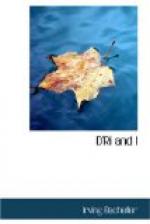I led my horse to the stable, scraped him of lather and dirt, gave him a swallow of water, and took the same myself, for I had a mighty thirst in me. When I came in, she had eggs and potatoes and bacon over the fire, and was filling the tea-kettle.
“On my soul,” said she, frankly, “you are the oddest-looking man I ever saw. Tell me, why do you carry the long club?”
I looked down. There it was under my arm. It surprised me more than anything I ever found myself doing.
“Madame, it is because I am a fool,” I said as I flung it out of the door.
“It is strange,” said she. “Your clothes—they are not your own; they are as if they were hung up to dry. And you have a sabre and spurs.”
“Of that the less said the better,” I answered, pulling out the sabre. “Unless—unless, madame, you would like me to die young.”
“Mon Dieu!” she whispered. “A Yankee soldier?”
“With good French blood in him,” I added, “who was never so hungry in all his life.”
I went out of the door as I spoke, and shoved my sabre under the house.
“I have a daughter on the other side of the lake,” said she, “married to a Yankee, and her husband is fighting the British with the rest of you.”
“God help him!” said I.
“Amen!” said she, bringing my food to the table. “The great Napoleon he will teach them a lesson.”
She was a widow, as she told me, living there alone with two young daughters who were off at a picnic in the near town. We were talking quietly when a familiar voice brought me standing.
“Judas Priest!” it said. D’ri stood in the doorway, hatless and one boot missing—a sorry figure of a man.
“Hidin’ over ‘n th’ woods yender,” he went on as I took his hand. “See thet air brown hoss go by. Knew ’im soon es I sot eyes on ‘im—use’ t’ ride ’im myself. Hed an idee ’t wus you ’n the saddle—sot s’ kind o’ easy. But them air joemightyful do’s! Jerushy Jane! would n’t be fit t’ skin a skunk in them do’s, would it?”
“Got ’em off a scarecrow,” I said.
“‘Nough t’ mek a painter ketch ’is breath, they wus.”
The good woman bade him have a chair at the table, and brought more food.
“Neck ’s broke with hunger, ’t is sartin,” said he, as he began to eat. “Hev t’ light out o’ here purty middlin’ soon. ‘T ain’ no safe place t’ be. ‘T won’ never dew fer us t’ be ketched.”
We ate hurriedly, and when we had finished, the good woman gave us each an outfit of apparel left by her dead husband. It was rather snug for D’ri, and gave him an odd look. She went out of doors while we were dressing. Suddenly she came back to the door.
“Go into the cellar,” she whispered. “They are coming!”
XII
I found the door, and D’ri flung our “duds” into the darkness that lay beyond it. Then he made down the ladder, and I after him. It was pitch-dark in the cellar—a deep, dank place with a rank odor of rotting potatoes. We groped our way to a corner, and stood listening. We heard the tramp of horses in the dooryard and the clinic of spurs on the stone step.




